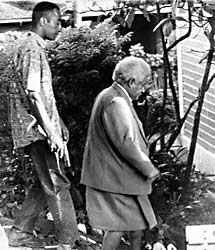|
|
|
Vice
President Takes Over In Crisis SUVA: University of the South Pacific student vice-president Mele Apisai has taken over acting leadership of the student body following the controversial barring of the student president from entering campus. She just arrived back in Suva from Kiribati along with other Kiribati students last week and was yesterday bewildered by the crisis when Pacific Journalism Online spoke to her. The president, Veresi Bainivualiku was locked out by university officials following an alleged assault on an Indo-Fijian student and threats against staff last Friday. A disciplinary hearing is expected to be called by university authorities to consider the affair. It is also alleged that Bainivualiku had also made racist slurs aimed at Indo-Fijian staff and security officers. The Association of University of the South Pacific Staff (AUSPS) president, Dr Biman Prasad, wrote to Vice-Chancellor Solofa calling for immediate expulsion of Bainivualiku from the university. Instead, the university barred Bainivualiku from entering university premises until the disciplinary committee meets. But a date has yet to be decided on the hearing. According to the university's secretariat administrative assistant, Titilia Tuinaceva, the administration is waiting for a report. The barring of Bainivualiku from campus has upset members of the Fijian Students Association (FSA). A meeting was held at the university's Orange Lounge on Tuesday, and a protest march was planned for yesterday. But this was called off and the reason given was that no action would be taken by the association until the outcome of the disciplinary hearing. According to sources who had attended the meeting, it was decided that the members would march to the administration office and hand over a petition letter airing their grievances. But this was denied by the president of FSA, Jone Fifita. Fifita has also criticised the handling of the crisis by the university. "When a group of Samoan students had a punch-up just before the coup, no one was barred from university," Fifita said. "When it came to Bainivualiku, he was barred barred straight away." The crisis on campus has prompted international reaction from visitors browsing the USP journalism website's feedback page, Pacific Journalism Online's Talanoa. Peni Gavidi, of Canada, said after viewing a story that the website ran on Bainivualiku. "It is sad to see that the country's institutions are working against the development of what used to be Fiji. "You have some elements of the army who acquired experience abroad and then lashed it out on it's own people. And then you have an educational institution whose students prefer to settle disputes by a punch-up rather than dialogue. "One wonders what kind of leaders are trained for the future." PJO tried to get comments from the person who was allegedly assaulted by Bainivualiku but he did not turn up for the interview yesterday. Fiji
Times Chief Editor Given Work Permit (PMW): Fiji's military-backed interim government has granted a work permit to the expatriate editor-in-chief of the newspaper suspected by the deposed elected government as having mounted a campaign against it, according to local news reports. Russell Hunter, a Scottish-born Australian with extensive Pacific experience, has been granted a work permit for three years with the proviso that a local media person be trained to take over the post when the permit expires. The Fiji Sun reported on 24 August 2000 following a report two days earlier by Fiji Television that Hunter had been granted a work permit. Immigration and Home Affairs Minister Ratu Talemo Ratakele confirmed the granting of the work permit, according to the Fiji Sun. The newspaper quoted the minister as saying: "Also noted was the fact that key posts needed to be taken up by overseas people to protect investments in our country." Deposed Prime Minister Mahendra Chaudhry, the first Indo-Fijian national leader of the Pacific country, as Information Minister and his cabinet colleagues frequently clashed with the media during their year in government. The Rupert Murdoch-owned Fiji Times was several times singled out for bitter criticism and at one stage was accused of "fanning the fires of sedition and racism", a charge the newspaper rejected. The Chaudhry government was not popular with some sectors of the Fiji news media and ownership as it pursued policies against privatisation and which were perceived to be anti-business. The deposed government gave priority to policies assisting the nation's high-level of poor and under-privileged urban and rural people. On May 19, the Chaudhry government was overthrown at gunpoint by failed businessman George Speight and his rebels who claiming to be acting for "indigenous rights". Less than a month earlier, on April 26, the Fiji High Court rejected an attempt by The Fiji Times to quash the Chaudhry government's decision to refuse a work permit extension for Hunter and he left the country shortly after. During the Fiji political crisis, local editors Netani Rika was acting editor of The Fiji Times and Samisoni Kakaivalu edited the sister paper, The Sunday Times. The Fiji Times Ltd also owns two weekly vernacular newspapers, in the Fijian and Hindi languages, which are edited by local journalists. The interim Information Minister and Communications Minister, Ratu Inoke Kubuabola, one of the conspirators in the 1987 coups, has faced allegations of being implicated in Speight's attempted coup. . . posters with messages that demand jobs and an end to poverty. These foot-soldiers are mobilisi |

